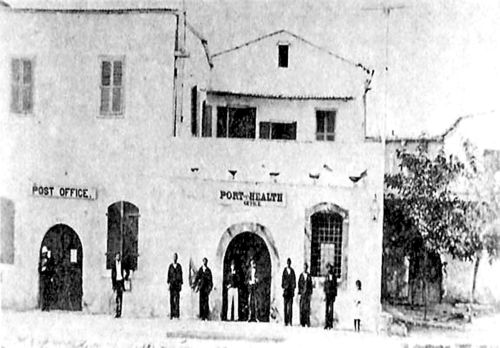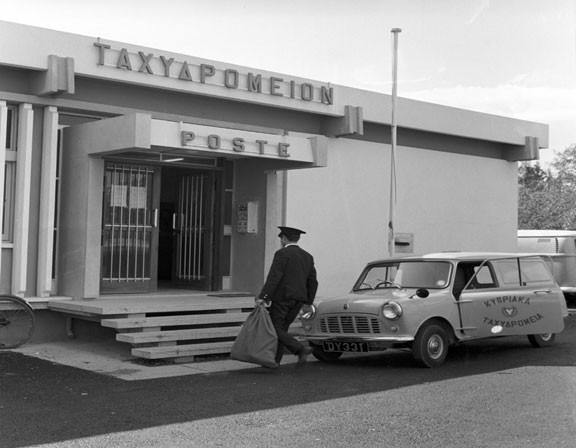Filenews 26 October 2025 - by Vassos Vassiliou
Two million parcels and small parcels were handled by the Cyprus Post within the year 2024 and this year it is estimated that the number of parcels that will be handled will be greater. Optimism for increased parcel / small parcel handling prevails for the next year as well. The relevant numbers were quoted to "F" by the Director of the Post Office, Mr. Pavlos Pavlidis, with whom we contacted on the occasion of the recent World Post Day.
Mr. Pavlidis, answering a relevant question, also stated that an effort is being made to serve the citizen in the best possible way, despite the intense competition and the change in the way people communicate, services, etc. As Mr. Pavlidis explained, the Post Office, in order to cope, proceeded with agreements whose effectiveness will be ascertained along the way. There are, he said, periods during which there is a higher movement of parcels and periods with less traffic, which depends on various factors.
What definitely plays a role is the price and quality offered by each postal organization through e-commerce platforms. It is important, said Mr. Pavlidis, to deliver something on time and of course in good condition.
However, the post offices, as they were known to the older ones (with paper and envelopes) have diversified to a great extent and especially from 2011 onwards, until the year 2024, the volume of traffic has been reduced by less than half.
As Mr. Pavlidis states, in total, while incoming and outgoing mail reached 61 million per year, in the year 2024 it decreased to 20 million. He further explains that the turning point in the handling of mail in the traditional way was the coronavirus pandemic and since then the downward trend has continued. The decline in printed correspondence was due to the fact that efforts were made to limit contact between people in order to control the transmission of the disease. At that time, there was an increase in communication through electronic media, social media, etc.
Of course, the shift towards digitization had been observed before the pandemic, but the coronavirus contributed to the peak of the phenomenon, says the director of the Post Office.
In a remark that no one expects that traditional correspondence will be eliminated, Mr. Pavlidis said that there will always be citizens who will choose the traditional way, either because they got used to it or because they were not familiar with the most modern media or for other reasons. As Mr. Pavlidis explains, this is happening even in Denmark, which is quite ahead of the issues of digitization and contact between the state and citizens.
In Cyprus, various bills are still paid in the traditional way (although the bills of public utility organizations have started to be paid by other methods, mainly with the digitization of the service), while several documents etc. are being processed. And of course, the volume of circulation through printed form is decreasing year by year.
However, citizens can pay at the post offices and the bills of the EAC and the EDA Limassol (water supply and sewerage) and it will be extended to the EDA Larnaca and at a later stage bills of other organizations will be paid.
Along with the bills, citizens' documents are also processed, while the courts conduct their correspondence in the traditional way (with summonses, e.g. photo-tagging), although these notices tend to be replaced by modern methods. There is, for example, electronic signature, electronic identity and other methods, which are not so widespread but are gradually estimated to gain ground. Of course, this process will not be completed overnight but will take time.
The director of the Post Office observes that we are not talking about a Cypriot phenomenon but about a global trend that all post offices are facing.
In relation to the situation in European countries, Cyprus is ranked among those with a higher percentage of decline in traditional mail. As he explains, there is a trend towards e-commerce in all post offices worldwide. This is also helped by the fact that the post offices have the largest network in the world, through which they move a relatively large volume of e-commerce items. In order for the post offices everywhere to cope, they entered the e-commerce game, but, apart from that, as Mr. Pavlidis explains, the post offices offer other services, as well as the post office of Cyprus, which handles a relatively large volume of parcels and small parcels, but, as he acknowledges, it is not easy to move the millions of items of postal mail.
It is noted that many of the small parcels come from China. However, several of them arrive in Cyprus via Budapest or the Netherlands, are cleared through customs and then arrive on the island as European.
Turnover: €73 million.
According to the Office of the Commissioner for the Regulation of Electronic Communications and Postal Services (OCCET), the postal services sector in Cyprus operates without restrictions in terms of activity both in services serving local and international courier services and in terms of the field of universal service. In addition to the universal provider (Cyprus Post) there are also 21 licensed providers operating in the market. The turnover of all licensed companies and organizations for 2022 amounted to €73 million. In the field of universal service, only the Cyprus Post is active, while the other postal providers are mainly active in local and international courier services.
As can be seen from the above, the Cyprus Post also undertakes the difficult non-profitable tasks to serve even the last citizen of the most remote community, while private companies focus on where there is profit.
In the above evolving and fluid landscape, the Cyprus Post is making a continuous effort with various moves, partnerships and new products to compete with the private companies that entered the game from 1/1/2013, when the postal market in Cyprus was liberalized.
It is worth mentioning that 90% of the "First Priority domestic" mail must be delivered the next day by the post office and achieving this goal is a constant struggle.
Along with everything else, 2021 was, according to the Post Department, a challenging year due to the implementation of new regulatory measures by the European Union, which have caused significant changes in the business model of postal organizations. The application concerns the abolition of the exemption from VAT for items containing goods, imported from non-EU members and with a value of less than €17.09, which has led to a reduction in the number of low-value e-commerce items imported into the EU and by extension into Cyprus.
Since the beginning of 2014, the Department has expanded its field of activity to serve the citizen by providing services on behalf of other Government Departments, while since October 2015, the Citizen Centers (KEPO) have operated, from which all the services of the Citizen Service Centers (KEP) are offered.
Fierce competition in small parcels
In a report by CEFR, it is stated that the intense competition between local courier service providers in recent years has led to fluctuations in market shares. In 2022, the sharp fluctuations in the shares of large providers observed in previous years were not observed.
Market shares (by number of items) differ from market shares (by turnover) on the one hand because a large number of postal items are small in size with relatively low shipping costs and on the other hand because of the different pricing of the providers. The shares of the two largest local courier providers have not changed significantly in 2022 compared to 2021.
Small parcels made their appearance more intense around 2019. The largest volume of small parcels (up to 2kg) comes from abroad and accounts for about 88.5% of their total for 2022. In 2022, outgoing and incoming (10%) small parcels show a decline, with local parcels showing a slight increase but constituting only 1.5% of all small parcels.
The Lusignans began postal communication
The Cyprus Post prides itself on having a long history, which the majority of citizens are obviously not aware of. In fact, it is claimed that few nations can boast of having such a rich tradition in the field of postal communications as Cyprus.

In fact, the Post Office indicates that, due to the location of Cyprus, which is a crossroads in the Eastern Mediterranean and a transit and supply station for ships, postal services operated from the end of the twelfth century in order to meet basic needs in the movement of people and goods, especially after the occupation of Cyprus by the Lusignans and then by the Venetians, who were the largest trading power at the time.
During the Lusignan period (1192) it is reported that when they conquered the island they began to build the first roads, which helped and promoted postal communication between the inhabitants of the island.
Subsequently, the Venetians, upon their arrival on the island in 1489, gave more importance to the road network, and in addition to the construction of roads, they built bridges to connect towns and villages as well as ports to serve their commercial activities. This transport development contributed to better communication between people through letters, messages, goods.
At that time, there was also an increased circulation of letters to and from abroad. In the interior, there is less traffic due to the low number of letters and the difficulties of transporting mail, which is transported by dirt roads that connected the cities with each other, as well as the large villages.
The Venetians, during their stay in Cyprus, founded the first Post Office.
According to the Post Office, the postal development observed during the Venetian occupation was interrupted during the period of the Ottoman rule, when the postal service was almost non-existent. The Turkish Post Office was founded only in 1871 with headquarters in Nicosia, which operated for only seven years.
In the years of its operation, it sold only 14 pounds. It was not an independent one, but a branch of the Turkish Central Post Office based in Damascus.
The letters destined for abroad were collected in Nicosia and the Turkish zaptieds forwarded them to Larnaca, from where they were then sent by the ships of the line to abroad. (The zaptiedes were Turkish policemen who, in addition to their normal duties, also performed everything else assigned to them).
The circulation of domestic mail was carried out by owners or hired carriage drivers where there were roads, for a fee, but in most cases free of charge, since they were satisfied with the treat of even one coffee from the recipient. The letters were stamped with the inscription "CYPRUS" in the Arabic script.
Merchants used the Austrian postal services instead of the Turkish ones, which under the auspices of the Austrian Consulate had been installed in the old marina of Larnaca in 1846 to send their mail mainly abroad. Austrian stamps were used as stamps and were stamped with handmade stamps.

A real Post Office (in the form we know it today) that ensured the transport of letters not only abroad but also within Cyprus, was organized by the British from the very first month they took over the administration of Cyprus in July 1878.
One of the priorities of the first High Commissioner and Governor of the island Sir Garnet is the establishment of a Post Office. From the very first month of his arrival, he founded a Post Office in Larnaca, dependent on the General Post Office of London. Among the employees of the post office there were also 4 Cypriots. Thus, we have the first Post Office on July 22, 1878.
For its proper operation, however, some foundations had to be laid. Within a month, a contract is signed between the government and the private sector for the transport of letters from Nicosia to Larnaca, once a day in a horse-drawn carriage. The agreement document states that the speed of the means of transport to be used should have been 6 miles per hour. In the carriage there should always be, 2 seats available for civil servants. If mail arrived from England outside the usual forwarding hours, it would have to be transported to its destination.

A few months later, branches of the Larnaca Post Office were established, in Nicosia, Kyrenia, Famagusta, Limassol and Paphos. Subsequently, to serve the countryside, postal agencies began to operate in various parts of Cyprus, mainly on roads that connected the cities with each other. These agencies were used as transit stations for other goods as well.
And of course, since the proclamation of the Republic of Cyprus, until today, leaps have been made in the postal sector.
